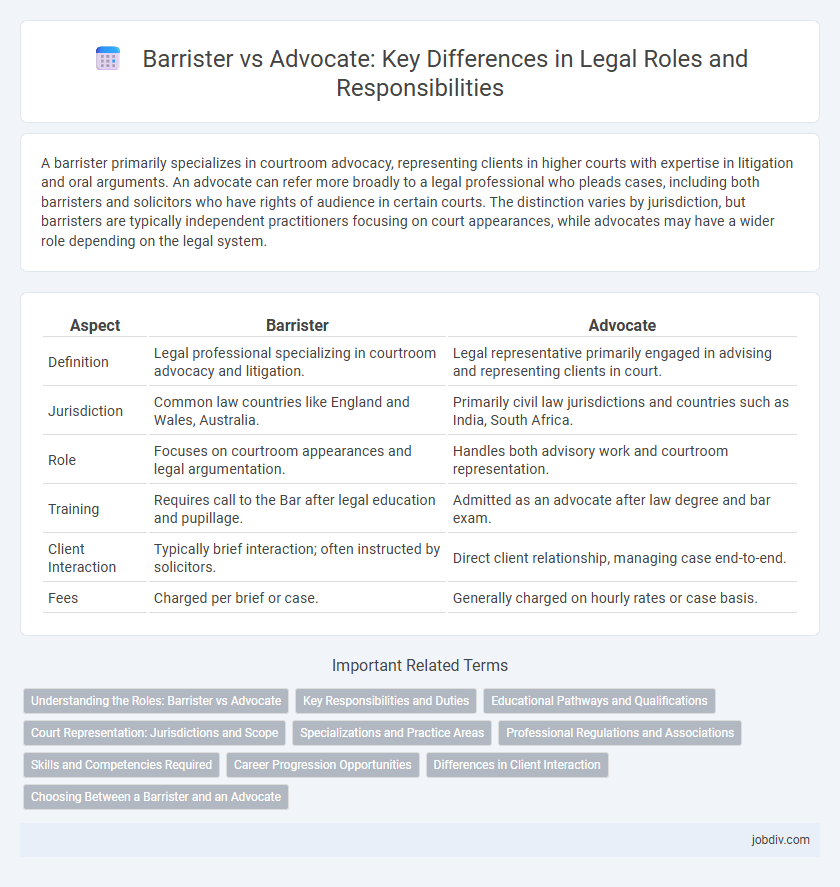A barrister primarily specializes in courtroom advocacy, representing clients in higher courts with expertise in litigation and oral arguments. An advocate can refer more broadly to a legal professional who pleads cases, including both barristers and solicitors who have rights of audience in certain courts. The distinction varies by jurisdiction, but barristers are typically independent practitioners focusing on court appearances, while advocates may have a wider role depending on the legal system.
Table of Comparison
| Aspect | Barrister | Advocate |
|---|---|---|
| Definition | Legal professional specializing in courtroom advocacy and litigation. | Legal representative primarily engaged in advising and representing clients in court. |
| Jurisdiction | Common law countries like England and Wales, Australia. | Primarily civil law jurisdictions and countries such as India, South Africa. |
| Role | Focuses on courtroom appearances and legal argumentation. | Handles both advisory work and courtroom representation. |
| Training | Requires call to the Bar after legal education and pupillage. | Admitted as an advocate after law degree and bar exam. |
| Client Interaction | Typically brief interaction; often instructed by solicitors. | Direct client relationship, managing case end-to-end. |
| Fees | Charged per brief or case. | Generally charged on hourly rates or case basis. |
Understanding the Roles: Barrister vs Advocate
Barristers specialize in courtroom advocacy, providing expert representation in higher courts and delivering complex legal arguments. Advocates, often seen in jurisdictions like South Africa and India, perform similar functions but may also handle client consultations and provide legal advice outside court. Understanding the distinct training, court appearances, and jurisdictional nuances clarifies how barristers and advocates serve unique yet overlapping roles in legal systems.
Key Responsibilities and Duties
Barristers primarily specialize in courtroom advocacy, providing expert legal opinions and representing clients during trials and hearings. Advocates hold the responsibility of defending clients in court, drafting legal pleadings, and advising on legal strategy, often engaging directly with judges and opposing counsel. Both roles require in-depth legal research, preparation of case documents, and adherence to ethical standards within the judicial system.
Educational Pathways and Qualifications
Barristers typically complete a law degree followed by the Bar Professional Training Course (BPTC) or its equivalent, including a one-year pupillage to gain practical experience. Advocates, especially in Scotland, pursue a law degree and then obtain the Diploma in Professional Legal Practice before undertaking a period of devilling under an experienced advocate. Both pathways demand rigorous academic preparation and professional training to ensure competence in courtroom advocacy and legal representation.
Court Representation: Jurisdictions and Scope
Barristers primarily represent clients in higher courts and specialize in courtroom advocacy and litigation within common law jurisdictions such as the UK, Australia, and Canada. Advocates, prevalent in civil law countries like Scotland and India, perform similar functions but may also handle extensive advisory roles beyond court appearances. The distinction in court representation hinges on jurisdiction-specific legal systems, where barristers are often restricted to higher courts, whereas advocates may have broader advocacy rights across various court levels.
Specializations and Practice Areas
Barristers specialize in courtroom advocacy, focusing on litigation, trial preparation, and legal opinions across criminal, civil, and commercial law. Advocates often handle a broader range of legal services, including client representation in lower courts, legal advice, and transactional matters in fields such as family law, property law, and administrative law. Both roles require expertise in statutory interpretation, case law, and procedural rules, but barristers typically engage in higher courts and complex legal disputes.
Professional Regulations and Associations
Barristers are regulated by the Bar Standards Board in England and Wales, ensuring compliance with the Bar Code of Conduct, while advocates in Scotland fall under the Faculty of Advocates, which enforces its own professional rules and disciplinary procedures. Both professions require membership in their respective representative bodies to practice law officially, providing ongoing training and ethical guidance for members. Regulatory frameworks emphasize client confidentiality, professional integrity, and competence, with sanctions ranging from fines to disbarment for violations.
Skills and Competencies Required
Barristers require expert skills in oral advocacy, legal research, and persuasive argumentation to effectively represent clients in higher courts, while advocates demonstrate strong interpersonal communication, negotiation, and case preparation abilities crucial for client counseling and trial proceedings. Proficiency in interpreting complex legal statutes and precedents is essential for both roles, ensuring precise application of law during litigation. Mastery of courtroom etiquette, ethical standards, and strategic thinking distinguishes barristers and advocates in the competitive legal environment.
Career Progression Opportunities
Barristers often experience a structured career progression through pupillage, tenancy, and potential appointment as Queen's Counsel, with opportunities to specialize in courtroom advocacy and advisory roles. Advocates typically advance by gaining experience in various courts and tribunals, with potential elevation to senior advocate or judicial positions within their legal systems. Both paths offer distinct professional development routes, with barristers focusing more on advocacy and legal consultancy, while advocates may engage extensively in litigation and higher court representation.
Differences in Client Interaction
Barristers typically engage with clients indirectly through solicitors, limiting direct client interaction primarily to court appearances and specialized legal advice. Advocates, especially in jurisdictions like Scotland and South Africa, often maintain direct communication with clients throughout case preparation and courtroom procedures. This difference influences the client's experience and the scope of personalized legal counsel provided.
Choosing Between a Barrister and an Advocate
Choosing between a barrister and an advocate depends on the jurisdiction and the specific legal matter involved, as barristers traditionally specialize in courtroom advocacy and litigation, while advocates may provide a broader range of legal services including legal advice and representation. Parties should consider barristers for complex trial work requiring expert oral argument, whereas advocates may be preferred for comprehensive client counsel and case preparation. Understanding the regulatory framework governing each role, such as the English Bar for barristers and various legal councils for advocates, ensures informed legal representation tailored to case demands.
Barrister vs Advocate Infographic

 jobdiv.com
jobdiv.com